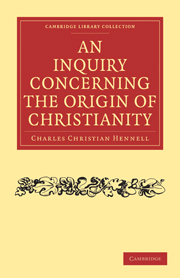Book contents
- Frontmatter
- PREFACE
- Contents
- ERRATA
- CHAPTER I Historical sketch, from the Babylonish captivity to the death of Jesus
- CHAPTER II Historical sketch, continued to the end of the first century
- CHAPTER III On the date and credibility of the Gospel of Matthew
- CHAPTER IV On the date and credibility of the Gospel of Mark
- CHAPTER V On the date and credibility of the Gospel of Luke
- CHAPTER VI On the date and credibility of the Gospel of John
- CHAPTER VII Examination of the accounts of the Resurrection and Ascension
- CHAPTER VIII Remarks on the other miracles in the four Gospels
- CHAPTER IX General objections to the miracles of Jesus
- CHAPTER X Remarks on the miracles in the Acts of the Apostles
- CHAPTER XI On the evidence afforded to the miracles by the apostolic writings
- CHAPTER XII On the prophecies
- CHAPTER XIII On the parts of Isaiah supposed to relate to Christ
- CHAPTER XIV On the book of Daniel
- CHAPTER XV Whether Jesus foretold his own death and resurrection
- CHAPTER XVI On the character, views, and doctrine of Jesus
- CHAPTER XVII Comparison of the precepts of Jesus with the Jewish writings
- CHAPTER XVIII Concluding reflections
- APPENDIX
CHAPTER XI - On the evidence afforded to the miracles by the apostolic writings
Published online by Cambridge University Press: 05 March 2012
- Frontmatter
- PREFACE
- Contents
- ERRATA
- CHAPTER I Historical sketch, from the Babylonish captivity to the death of Jesus
- CHAPTER II Historical sketch, continued to the end of the first century
- CHAPTER III On the date and credibility of the Gospel of Matthew
- CHAPTER IV On the date and credibility of the Gospel of Mark
- CHAPTER V On the date and credibility of the Gospel of Luke
- CHAPTER VI On the date and credibility of the Gospel of John
- CHAPTER VII Examination of the accounts of the Resurrection and Ascension
- CHAPTER VIII Remarks on the other miracles in the four Gospels
- CHAPTER IX General objections to the miracles of Jesus
- CHAPTER X Remarks on the miracles in the Acts of the Apostles
- CHAPTER XI On the evidence afforded to the miracles by the apostolic writings
- CHAPTER XII On the prophecies
- CHAPTER XIII On the parts of Isaiah supposed to relate to Christ
- CHAPTER XIV On the book of Daniel
- CHAPTER XV Whether Jesus foretold his own death and resurrection
- CHAPTER XVI On the character, views, and doctrine of Jesus
- CHAPTER XVII Comparison of the precepts of Jesus with the Jewish writings
- CHAPTER XVIII Concluding reflections
- APPENDIX
Summary
Paley admits (Evid. part iii. ch. v.), that the Apostles appealed less frequently than he himself should have done to the miracles, and he attributes this to the want of a due appreciation of miracles in that age, owing to the general belief in magical agency. But the excuse seems insufficient. The church of Rome, whilst denouncing practisers of witchcraft, has been eager enough to set forth its own miracles. The Jews who believed in the magical acts of Pharaoh's magicians, were not the less forward to celebrate the miracles of Moses; and the disciples, if not admitting the absolute conclusiveness of a miracle as a divine credential, were yet well aware of its great value. For they admit that the Jews frequently required a sign, and John makes Jesus say, “Unless ye see wonders and signs, ye will not believe.”
The four Gospels and the Acts were written at a comparatively late period, viz. forty years and upwards after the death of Christ, or a distance of time varying from ten to forty years after the events recorded. But most of the Epistles were written earlier, whilst the Apostles were administering the affairs of the church, and consequently in the midst of the miraculous period. Moreover, in these writings, at least in the Epistles of Paul, John, James, and the first of Peter, we may fairly calculate upon having very nearly these Apostles’ own words. Let us collect all the passages in these Epistles which seem to allude to the miracles of Jesus or of his disciples.
- Type
- Chapter
- Information
- An Inquiry Concerning the Origin of Christianity , pp. 209 - 215Publisher: Cambridge University PressPrint publication year: 2010First published in: 1838



